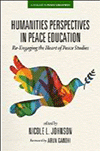
Humanities Perspectives in Peace Education
Re-Engaging the Heart of Peace Studies
Edited by:
Nicole L. Johnson, University of Mount Union
A volume in the series: Peace Education. Editor(s): Laura L. Finley, Barry University.
Published 2021
In Humanities Perspectives in Peace Education: Re-Engaging the Heart of Peace Studies, scholar-teachers across a variety of humanities fields explore the content, methods, and pedagogies that are unique to their respective disciplines in contributing to the study of peace and justice. In recent decades, even as peace scholarship has burgeoned, many peace studies texts—including those that purport to be interdisciplinary in nature—have emphasized social science perspectives and, in some cases, have foregone exploration of the role of the humanities altogether in comprehensive peace education. While humanities scholars continue to stake out space for peace scholarship within their fields, no volume has attempted to collect the wisdom of multiple humanities disciplines in order to make the case for their critical role in authentic peace education. Humanities Perspectives in Peace Education addresses that shortcoming in the field of peace studies by exploring the ways in which the humanities are uniquely situated to contribute particular content, knowledge, skills, and values required of comprehensive peace education, scholarship, and activism. These include the development of empathy and understanding, creative vision and imagination, personal and communal transformation toward “the good” in society (such as the pursuit of justice, nonviolence, freedom, and human thriving), and field-specific analytical lenses of their own, among other contributions.
Both teachers and students of peace will find value in this interdisciplinary humanities volume. Each chapter of Humanities Perspectives in Peace Education offers a deep-dive into a particular humanities field—including philosophy, literature, language and culture studies, rhetoric, religion, history, and music—to mine the field’s unique contributions to peace and justice studies. Scholars ask: “What are we missing in peace education if we fail to include this academic discipline?” Chapters include suggestions for peace pedagogies within the humanities field as well as bibliographies and suggestions for further reading.
CONTENTS
Foreword, Arun Gandhi. Acknowledgments. Introduction: Peace Education and the Humanities, Nicole L. Johnson. Philosophy in the Pursuit of Peace, G. Scott Gravlee. “You Can’t Really Change the Heart Without Telling a Story”: Poetry as Peacebuilding, G. Michelle Collins-Sibley. Promoting Peace in Cultural and Language Studies, Rebecca L. Oxford, María Matilde Olivero, and Tammy Gregersen. Rhetoric and Peace Studies, Jamie Capuzza and Sean Patrick O’Rourke. The Study of Religion in Comprehensive Education for Peace: On Learning to Make Room for Difference, Nicole L. Johnson. The Past’s Presents for a Just and Peaceful Future, Theresa M. Davis. “A Choir Is a Beautiful Thing”: Peacebuilding and Reconciliation through the Cultivation of Beauty, Grant W. Cook, III. About the Contributors.
-
Paperback978-1-64802-570-9
Web price: $45.04 (Reg. 52.99)
-
Hardcover978-1-64802-571-6
Web price: $80.74 (Reg. 94.99)
- eBook978-1-64802-572-3

- EDU029050 - EDUCATION: TEACHING METHODS & MATERIALS: Arts & Humanities
- EDU040000 - EDUCATION: Philosophy & Social Aspects
- EDU021000 - EDUCATION: Non-Formal Education
-
 Coronavirus and Vulnerable People
Addressing the Divide in Harm and Responses and Exploring Implications for a More Peaceful World
Coronavirus and Vulnerable People
Addressing the Divide in Harm and Responses and Exploring Implications for a More Peaceful World
-
 Difficult Discussions
Issues and Ideas for Engaging College Students in Peace and Justice Topics
Difficult Discussions
Issues and Ideas for Engaging College Students in Peace and Justice Topics
-
 Experiential Learning in Higher Education
Issues, Ideas, and Challenges for Promoting Peace and Justice
Experiential Learning in Higher Education
Issues, Ideas, and Challenges for Promoting Peace and Justice
-
 Lessons for Creating a Culture of Character and Peace in Your Classroom
A Playbook for Teachers
Lessons for Creating a Culture of Character and Peace in Your Classroom
A Playbook for Teachers
-
 Peace is Everyone's Business
Peace is Everyone's Business
-
 Teaching Peace Through Popular Culture
2nd Edition
Teaching Peace Through Popular Culture
2nd Edition
-
 The New Peace Linguistics and the Role of Language in Conflict
The New Peace Linguistics and the Role of Language in Conflict

